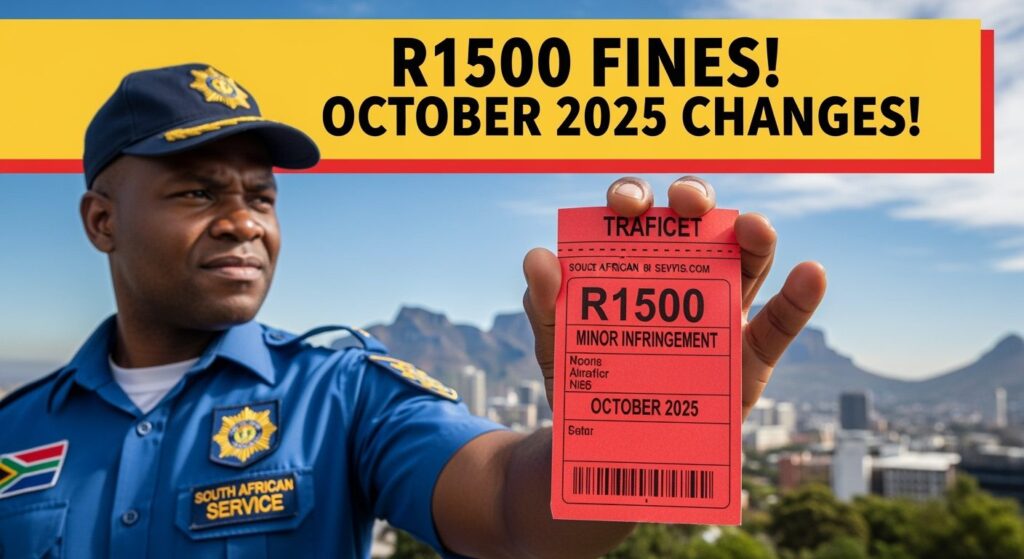South African Traffic Penalties: Have you noticed how driving in South Africa is becoming increasingly expensive? I certainly have, and it’s not just about the fuel prices anymore. Starting October 2025, South African drivers will face substantially increased traffic fines for what many would consider everyday mistakes on the road. The new penalty structure aims to improve road safety by hitting drivers where it hurts most—their wallets. As someone who regularly navigates our busy roads, I’m concerned about how these changes will affect all of us who depend on driving for our daily activities. The October 2025 traffic fines represent the most significant overhaul of our penalty system in years.

What Are The New Traffic Fine Increases?
The October 2025 traffic fines introduce steep penalties for violations that previously carried more modest consequences. Minor offenses like failing to signal properly will now cost you up to R1,500, while using a mobile phone while driving jumps to a shocking R3,000. Speed violations have seen the most dramatic increases, with fines now calculated as a percentage of your monthly income for exceeding limits by more than 30km/h. Even parking violations haven’t escaped the hike, with illegal parking in disabled spots now carrying a R2,500 penalty. These changes reflect the government’s zero-tolerance approach to traffic violations and their determination to make South African roads safer through financial deterrents.
| Violation | New Fine (October 2025) |
|---|---|
| Mobile phone use while driving | R3,000 |
| Failure to signal | R1,500 |
| Illegal parking (disabled spot) | R2,500 |
Why Have These Penalties Increased So Dramatically?
The dramatic increase in South African traffic penalties stems from concerning road safety statistics. With over 14,000 road fatalities annually, our country has one of the highest road death rates globally. Officials believe that the previous fine structure simply wasn’t effective as a deterrent. Many drivers considered the old fines as merely a minor inconvenience—almost a “cost of doing business” for habitual offenders. The new October 2025 traffic fines aim to create genuine behavioral change by making violations financially painful. Additionally, the revenue generated from these increased penalties will reportedly be channeled into road infrastructure improvements and enhanced traffic enforcement technologies, creating a virtuous cycle of better road safety measures.
How Will These Fines Be Enforced?
Enforcement of the new penalty structure will rely heavily on technology. The government has invested in a nationwide network of AI-powered cameras capable of detecting a wider range of violations than ever before. These smart systems can identify not just speeding, but also mobile phone use, seatbelt violations, and even aggressive driving patterns. Additionally, traffic officers will receive enhanced training and equipment to document violations more effectively. The electronic ticketing system will be streamlined, making it harder to avoid penalties through administrative loopholes. Perhaps most significantly, the new system links directly to license renewals, meaning unpaid fines will automatically block your ability to renew your driver’s license or vehicle registration—a powerful incentive for compliance.
When Will Drivers Start Feeling The Impact?
While the October 2025 traffic fines officially take effect on the first of that month, the transition won’t happen overnight. The implementation follows a three-phase approach. Phase one begins with a one-month awareness campaign in September 2025, during which drivers will receive warnings rather than actual fines under the new structure. Phase two starts in October with full implementation of the new fine amounts, but with a 50% discount for prompt payment within seven days. By December 2025, phase three begins with the complete integration of the penalty system with license renewals and vehicle registrations. This means that by early 2026, the full impact of the new system will be unavoidable for South African drivers. Are you prepared for this significant change to our driving culture?
Real-World Impact: The Case of Johannesburg Commuters
I recently spoke with Thomas Nkosi, a sales representative who drives approximately 200km daily across Johannesburg for work. Under the current system, Thomas typically accumulates about R2,000 in traffic fines annually—mostly for minor speeding infractions. With the October 2025 traffic fines structure, his projected annual fine exposure jumps to over R15,000 for the same driving behavior. “This will completely change how I plan my day,” Thomas told me. “I’ll need to leave earlier for appointments and accept that I simply can’t rush between meetings anymore. The new fines would eat up my entire commission if I continue driving the way I do now.” His situation illustrates how these penalties will force behavioral changes among professional drivers who have previously factored occasional fines into their cost of doing business.




